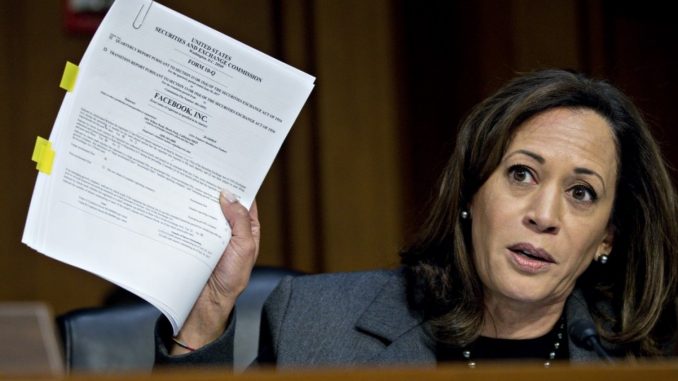
When Congress launched an effort in August to enable prosecution of online sex trafficking by amending the Communications Decency Act, the titans of the Internet such as Google and Facebook rose up in opposition. Having to police the vast amount of content on their websites would be too burdensome, they said; smaller sites without big legal teams would face overwhelming liability and who knew what unforeseen lawsuits would be made possible by changing a law known as “the bedrock of the Internet”?
But now “Big Tech,” whose opposition was anticipated to be a major stumbling block to amending the law, has mostly backed down. After working with Senate staff members to obtain what they see as important changes to the language of the bill, the Internet Association announced late Friday that it supports the Stop Enabling Sex Traffickers Act, also known as SESTA.
[Mother of slain teen makes tearful plea for Congress to amend Internet law]
Also Friday, the two Democratic senators from California who had not weighed in on the bill, Kamala D. Harris and Dianne Feinstein, both announced their support for it. Some had thought that pressure from California-based Internet companies might sway them, but ultimately they endorsed the measure, removing yet another potential hurdle to passage.
The Senate bill, and a similar one in the House, were inspired by the numerous court victories won by Backpage.com, an online classified ads site that hosts massive advertising for prostitution, including an unknown percentage of children being trafficked by adult pimps. Backpage has successfully cited the Communications Decency Act, which protects websites from liability for posts by third parties, to evade both criminal prosecution and civil lawsuits. As attorney general of California, Harris launched a criminal case against Backpage for prostitution, and it was thrown out by a judge who cited the Communications Decency Act.
The Senate’s subcommittee on investigations sparked congressional action when it found that Backpage was editing ads to remove references to underage prostitutes, but allowing the ads to remain online. Then, in July, The Washington Post revealed that Backpage was actively soliciting ads from prostitutes on other websites, and creating new ads for those prostitutes so that they could post on Backpage with just one click.
[Backpage has always claimed it doesn’t control sex-related ads. New documents show otherwise.]
Some members of Congress called for the Justice Department to investigate Backpage for seemingly creating illegal content, not just hosting it. And some opponents of the new bill cited The Post story as evidence that Backpage could be prosecuted under the existing law, with no need to amend the law and possibly open up unforeseen areas of civil and criminal liability.
After the bill was introduced, tech lobbyists worked Capitol Hill trying to drum up opposition. Google issued a statement saying the proposed bill “would be a disaster” and “would actually hinder the fight against sex trafficking.”
[Tech companies push back as Congress tries to fight online sex trafficking]
But members of the tech community worked with Senate Commerce Committee staff to tweak the language of the bill, which is scheduled for markup Wednesday. One of the keys was the definition of “participation in a venture” in an anti-sex-trafficking statute, which courts have found did not include Internet sites hosting illegal content. The proposed bill originally defined participation as “knowing conduct, by an individual or entity, by any means, that assists, supports or facilitates a violation” of sex trafficking laws.
Internet companies thought the phrase “by any means” had the potential to be broadly interpreted when analyzing a website’s actions. The newly amended bill changes the definition of participation to simply “knowingly assisting, supporting, or facilitating a violation” of sex trafficking laws, Senate staff members said.
The changes to the bill also amend the standard by which state prosecutors can seek to charge or sue websites, requiring them to meet the federal standard, including the new definition above, rather than those established by state law, which can vary widely.

Yvonne Ambrose, mother of slain teen Desiree Robinson, speaks to a reporter after testifying before a Senate committee considering amending the Communications Decency Act. (Tom Jackman/The Washington Post)
Michael Beckerman, president of the Internet Association, which counts Google, Twitter and Microsoft among its members, said in a statement that “Important changes made to SESTA will grant victims the ability to secure the justice they deserve, allow internet platforms to continue their work combating human trafficking, and protect good actors in the ecosystem.”
Beckerman said the association was looking “forward to working with the House and Senate as SESTA moves through the legislative process to ensure that our members are able to continue their work to fight exploitation.”
Sen. Rob Portman (R-Ohio) and other members of the Commerce Committee welcomed the endorsement from the Internet Association. “I’m pleased we’ve reached an agreement,” Portman said in a statement. “We’ve reached an agreement to further clarify the intent of the bill and advance this important legislation.”
John Simpson of Consumer Watchdog, which has tracked how big Internet companies have aggressively fought changes to the Communications Decency Act, said: “We’re quite happy they came on board. We wish they’d done it sooner.” He said the grilling that executives from Facebook, Twitter and Google absorbed last week during hearings over Russian interference in last year’s election may have pushed the association into endorsing the bill.
“I think that’s what pushed the Internet Association into saying, ‘Okay, we better get on board,’ ” Simpson said.
Not every Internet group is on board. NetChoice, another Internet trade group that has brought lawsuits against state laws imposing sales tax mandates and privacy restrictions, used former congressman Chris Cox, who co-wrote the Communications Decency Act, to testify against the bill in the House last month, and remains opposed to it.
Steve DelBianco, president of NetChoice, said Monday that it was “good to see the progress made from collaborative efforts on all sides,” but that the group still favored using existing laws to go after online traffickers, as Cox advocated. “Federal prosecutors are apparently having trouble bringing sex traffickers to justice — even though they’re explicitly unhindered by Section 230″ of the Communications Decency Act, DelBianco said. “We need stronger legal remedies than just amending” the anti-sex-trafficking statute, he added.
Source washingtonpost



Be the first to comment